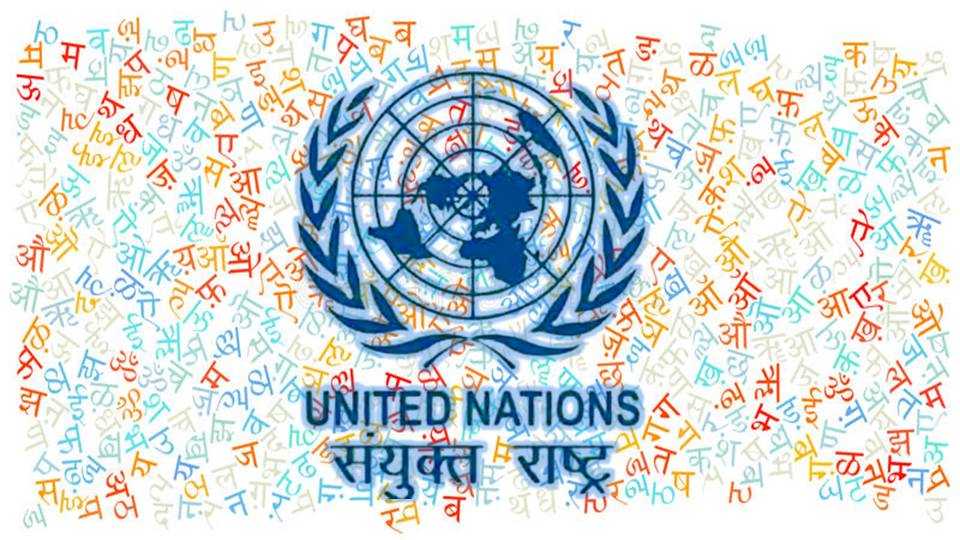Language is not just an instrument of expression or communication. It reflects the evolution of human civilization & culture. A language’s growth or its subsistence reflects the dark as well as the rich chapters of human history. The inclusion of each word tells about the conflict and confluence of different cultures. So, it becomes very important for modern society to preserve and protect unique languages and their scripts. In the age where English has become the language of bread and native languages are on the verge of extinction, the focus of the state and its people should be to provide the due recognition of its language.
Hindi@UN
Recently, the United Nations General Assembly (UNGA) has adopted the resolution on multilingualism cosponsored by India. The resolutions recognize the use of Hindi language as an important communications & messages at the UN. In addition to Hindi, other languages recognized by the UN are Portuguese, Kiswahili, Persian, Bangla, and Urdu. The effort is to promote multilingualism and encourage the UN to disseminate all the communications of the organization in six official languages, as well as in non-official languages whenever appropriate, within existing resources.
Permanent Representative of India to the UN, TS Tirumurti thanking the UNGA for the adoption of the resolution said that “This year for the first time the resolution has a mention of Hindi language. India has been partnering with the UN department of global communication since 2018 by providing an extra-budgetary contribution to mainstream and consolidating news and multimedia content in the Hindi language. As part of these efforts, the Hindi@UN project was launched in 2018 with an objective to enhance the public outreach of the UN of the Hindi language and to spread greater awareness about the global issue among millions of Hindi-speaking populations around the world”.
An exchange in the LokSabha today on why India shouldn't waste time&money making Hindi an official language of the @UN: https://t.co/oLpX5x7pm6 Also the countries @SushmaSwaraj named would not use Hindi at the UN so we'd be speaking to ourselves!
— Shashi Tharoor (@ShashiTharoor) January 3, 2018
Read More: The Hindi momentum is not going to die. After Devgn, Rampal, and Muntashir step in
Pt. Vajpayee’s Dream
When Bharat Ratan Shri Atal Bihari Vajpayee was the foreign minister under the Janata Party government headed by then prime minister Morarji Desai, he had the opportunity to address the UNGA’s 32nd session in 1977. Reports suggest that despite being fluent in English, he chose to address the assembly in his mother tongue and he was the main force behind the uplifting of Hindi on the international platform in the age when English was dominating every institution and was viewed as the language of ‘masters’. His pride in speaking in mother tongue was followed by Prime Minister Modi.
Even though 55% of the population of India speaks Hindi and 85-90% of people in the country understand Hindi even though it is not their mother tongue, but the language was neglected. The successive governments used to give bizarre arguments to not let the language be recognized on international platforms.
In the debate related to the Hindi@UN in Parliament, Congress leader Shashi Tharoor opposing the government’s effort said that “if tomorrow someone from Tamil Nadu or from West Bengal becomes the Prime Minister, why should we force him to speak in Hindu at UN ”. Further opposing the decision he had said that “Hindi is the official language of only one country”.
Shashi Tharoor debating why Hindi shouldn't be India's National Language
The dynast mindsets have no trouble borrowing foreign English to be the national language but the most spoken Hindi is shunned more so for 'Sibling Rivalry'@Payal_Rohatgi#StopHindiImperialis pic.twitter.com/LWcTRvDC7A
— 𝘼𝙮𝙪𝙨𝙝 𝙆. 𝙎𝙧𝙞𝙫𝙖𝙨𝙩𝙖𝙫𝙖 🇮🇳 (@AyushSri2906) September 14, 2019
An exchange in the LokSabha today on why India shouldn't waste time&money making Hindi an official language of the @UN: https://t.co/oLpX5x7pm6 Also the countries @SushmaSwaraj named would not use Hindi at the UN so we'd be speaking to ourselves!
— Shashi Tharoor (@ShashiTharoor) January 3, 2018
But correcting the fact of Shashi Tharoor, former foreign minister Sushma Swaraj had said that “he was unaware that Hindi is the language of Fiji and also spoken widely in Mauritius, Surinam, Trinidad and Tobago, and many other countries”.
Following this, the Hindi@UN project was launched under the leadership of former foreign minister Sushma Swaraj in 2022 around 62 crores was contributed to the UN for the promotion of Hindi in the communication and messaging of the United Nations.
The seed was sown in 1977 at UNGA by former PM of India, Shri Atal Bihar Vajpayee has reaped in 2022 in the form of the formal adoption of Hindi as the non-official language of the UN. Moreover, the key facilitator of this idea, former foreign minister Sushma Swaraj must be appreciated for personally taking an active part in the project.
The speaking in mother tongue by national leaders like Atal Bihari Vajpayee, Narendra Modi, and Sushma Swaraj on international platforms also gives a sense of pride and confidence among common people who speak in their mother tongue and find it difficult to communicate in an international language like English. Moreover, recognition of Hindi at the international level is not only acceptance of a language but also the recognition of centuries of cultural preservation which mold the current form of language, script or its words.
Support TFI:
Support us to strengthen the ‘Right’ ideology of cultural nationalism by purchasing best quality garments from TFI-STORE.COM
